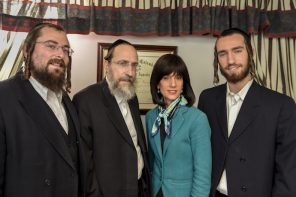40,000 people at Citi Field? Can’t be for a Mets game—no, must be an ultra-Orthodox rally/teach-in/info session on the dangers of what you’re doing right now: browsing the Internet. And so it is: tonight, with overflow seating at the Arthur Ashe tennis center (yes, the event is sold out) and simulcast to schools in Borough Park.
I suspect most readers are, by now, chuckling to themselves—as, admittedly, I did myself. After all, the New York Times coverage of the event notes the sale of “kosher” smartphones that limit Internet use. This is funny stuff.
But on second thought, aren’t the ultra-Orthodox right? This is an insular community that has built real and virtual walls to shield itself from secular influences. Aren’t they correct to worry that if their adherents surf the Internet, the community will suffer?
I think they are. One reason I write for publications like this one is to make a difference, to share information that people may not ordinarily hear about, and offer some perspective on issues like this one. (Okay, maybe this is getting too meta-.) I hope that I’m not only preaching to the choir; I hope that there are people who read my work, feel challenged by it, and then think and rethink their positions.
And of course, no amount of ink-spilling can make as much difference as a Lady Gaga video or an episode of Glee. (In somewhat related news, Hong Kong evangelicals plastered the city-state with posters warning Christians to stay away from a planned Lady Gaga concert that would include “pornographic, homosexual and satanic elements.” Well, two out of three ain’t bad.) Or the YouTube videos of Hasidim who are glad to have left the fold. Or websites devoted to egalitarian, LGBT-inclusive, and open-minded Judaism. The rabbis are right to worry, are they not?
Maybe what’s ridiculous here is the irony: tens of thousands of ultra-Orthodox men using technology, cramming into Citi Field, and learning why they should fear technology. Then again, no ultra-Orthodox authorities can really ban the Internet, and the Hasidim are not like the Amish, willing Luddites rejecting “modernity.” They’re rejecting certain aspects of modernity—cultural and moral ones, in particular.
Or maybe it’s just the futility of it all. Surely, as the proposed reality TV show “The Unchosen Ones” and Hella Winston’s similarly-titled book, Unchosen, show, ghetto walls are highly permeable these days. There’s something almost quaint about 40,000 middle-aged men thinking they can stop their teenagers from tweeting. Even if they can.
I think, though, the reason these stories strike a chord is that they remind New Yorkers like me that only a few miles from where I sit, people are living in a different century—and I don’t even mean the 20th. Here in Park Slope, there are more lesbians than coffee shops, and more coffee shops than trees. Yet a few blocks down in Crown Heights, or across the park in Flatbush, thousands of people have lifestyles and morals that wouldn’t pass the laugh test over here. They think we’re sinners, we think they’re throwbacks, and yet we ride the same subways, crowd the same streets.
Unfortunately, as secular and moderate Israelis have long known, the ultra-Orthodox minority is not content to keep its morality to itself. These people aren’t Tevye in Fiddler on the Roof: as soon as they gain enough political power, they use that power to change laws, segregate the sexes, fund their religious schools, and foist their vision onto the rest of us.
Moreover, as a handful of protesters have recognized, this anti-Internet rally is taking place in the shadow of an unprecedented probe into sexual abuse in the ultra-Orthodox community, which appears to be rampant. When ultra-Orthodox rabbis aren’t busy railing against the Internet, some of them are busy covering up hideous instances of abuse among their flock or intimidating witnesses. That’s certainly not Tevye either.
Maybe, then, we’re laughing because otherwise we might be terrified.




